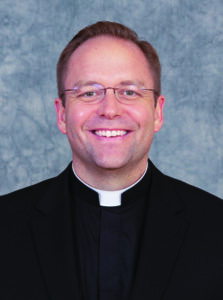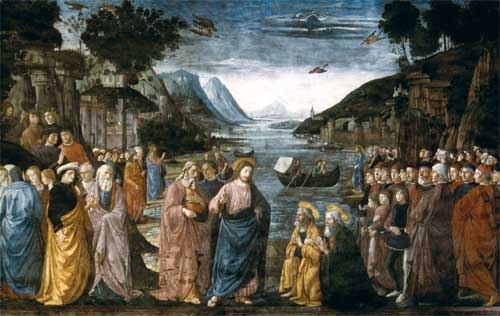Podcast: Play in new window | Download (Duration: 27:10 — 18.8MB) | Embed
Subscribe: Apple Podcasts | Spotify | Amazon Music | Android | Pandora | iHeartRadio | JioSaavn | Podchaser | Gaana | Podcast Index | Email | TuneIn | Deezer | Anghami | RSS | More

St. Catherine of Siena, Part 1 – The Doctors of the Church: The Charism of Wisdom with Dr. Matthew Bunson
- Born: March 17, 1347, Siena, Italy
- Died: April 29, 1380, Rome
- Nationality: Italian
Dr. Matthew Bunson and Kris McGregor delve into the life of St. Catherine of Siena, a remarkable Doctor of the Church. They discuss the significance of understanding St. Catherine within the context of her upbringing in Tuscany, particularly in the vibrant city of Siena, where she was born in 1347. Growing up as the youngest of 25 children, St. Catherine was deeply influenced by her surroundings, including the prominent presence of the Dominicans in Siena. Despite her family’s expectations, she felt called to a life of prayer and contemplation from a young age, eventually joining the Dominican third order at 16.
Her spiritual journey was marked by profound mystical experiences, including a mystical marriage with Christ at age 21. Blessed Raymond of Capua, a prominent Dominican figure, became her confessor and spiritual director, validating the authenticity of her experiences and teachings. St. Catherine’s wisdom and spiritual insight attracted people from all walks of life, including kings and queens, who sought her counsel.
Throughout her life, St. Catherine remained faithful to the teachings and authority of the Church, debunking modern interpretations that paint her as a rebel against patriarchal structures. Instead, she embraced the Church’s authority and worked tirelessly for its well-being, leaving a legacy of love, service, and profound spiritual wisdom.
For more on St. Catherine of Siena and her teachings visit her Discerning Hearts page.
Discerning Hearts Reflection Questions
- Understanding the Context: How does the setting of Tuscany and the city of Siena shape St. Catherine of Siena’s spirituality and mission?
- Early Influences and Spiritual Formation: What were some significant events in St. Catherine’s early life that contributed to her decision to join the Dominican third order at a young age?
- Mystical Experiences: Reflect on the significance of St. Catherine’s mystical marriage with Christ and its impact on her spiritual journey.
- Role of Authority and Discernment: How does Blessed Raymond of Capua’s role as St. Catherine’s confessor and spiritual director exemplify the importance of submitting to the authority of the Church in one’s spiritual life?
- Legacy and Misconceptions: Discuss the misconception of St. Catherine as a rebel against patriarchal structures in the Church and reflect on her true legacy of faithfulness and service to the Church.
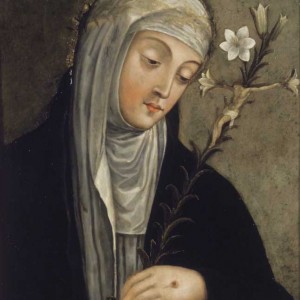
From Vatican.va, an excerpt from the teachings of Pope Benedict XVI
From the General Audience on St. Catherine of Siena
“Today I would like to talk to you about a woman who played an eminent role in the history of the Church: St Catherine of Siena. The century in which she lived — the 14th — was a troubled period in the life of the Church and throughout the social context of Italy and Europe. Yet, even in the most difficult times, the Lord does not cease to bless his People, bringing forth Saints who give a jolt to minds and hearts, provoking conversion and renewal.
Catherine is one of these and still today speaks to us and impels us to walk courageously toward holiness to be ever more fully disciples of the Lord.
Born in Siena in 1347, into a very large family, she died in Rome in 1380. When Catherine was 16 years old, motivated by a vision of St Dominic, she entered the Third Order of the Dominicans, the female branch known as the Mantellate. While living at home, she confirmed her vow of virginity made privately when she was still an adolescent and dedicated herself to prayer, penance and works of charity, especially for the benefit of the sick.
When the fame of her holiness spread, she became the protagonist of an intense activity of spiritual guidance for people from every walk of life: nobles and politicians, artists and ordinary people, consecrated men and women and religious, including Pope Gregory xi who was living at Avignon in that period and whom she energetically and effectively urged to return to Rome.
She travelled widely to press for the internal reform of the Church and to foster peace among the States. It was also for this reason that Venerable Pope John Paul ii chose to declare her Co-Patroness of Europe: may the Old Continent never forget the Christian roots that are at the origin of its progress and continue to draw from the Gospel the fundamental values that assure justice and harmony.
Like many of the Saints, Catherine knew great suffering. Some even thought that they should not trust her, to the point that in 1374, six years before her death, the General Chapter of the Dominicans summoned her to Florence to interrogate her. They appointed Raymund of Capua, a learned and humble Friar and a future Master General of the Order, as her spiritual guide. Having become her confessor and also her “spiritual son”, he wrote a first complete biography of the Saint. She was canonized in 1461.”
For more visit Vatican.va
For more from Dr. Matthew Bunson, check out his Discerning Hearts page.
Dr. Matthew E. Bunson is a Register senior editor and a senior contributor to EWTN News. For the past 20 years, he has been active in the area of Catholic social communications and education, including writing, editing, and teaching on a variety of topics related to Church history, the papacy, the saints and Catholic culture. He is faculty chair at Catholic Distance University, a senior fellow of the St. Paul Center for Biblical Theology, and the author or co-author of over 50 books including The Encyclopedia of Catholic History, The Pope Encyclopedia, We Have a Pope! Benedict XVI, The Saints Encyclopedia and best-selling biographies of St. Damien of Molokai and St. Kateri Tekakwitha.


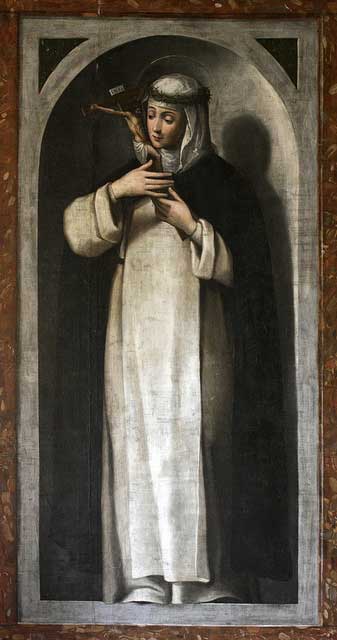

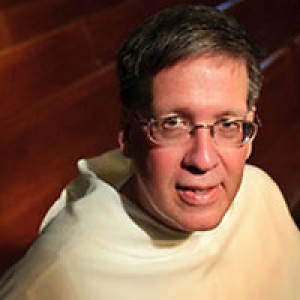
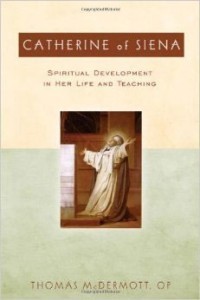
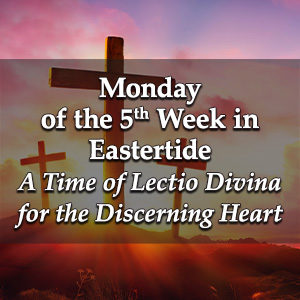 Monday of the Fifth Week of Eastertide – A Time of Lectio Divina for the Discerning Heart Podcast
Monday of the Fifth Week of Eastertide – A Time of Lectio Divina for the Discerning Heart Podcast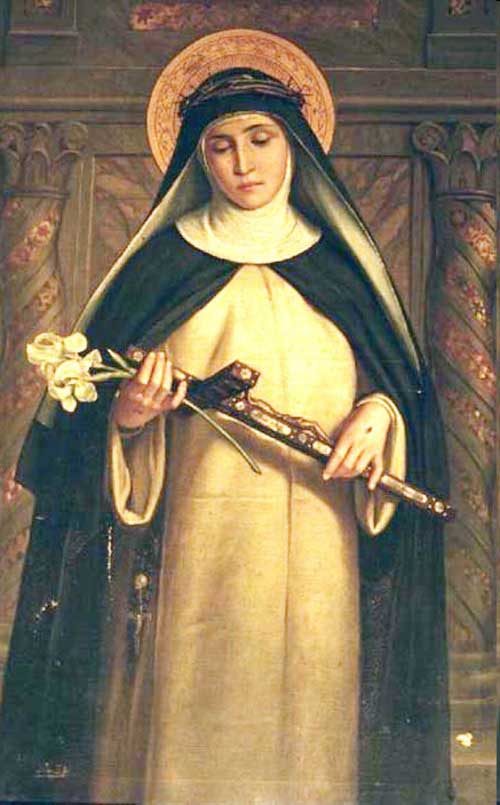
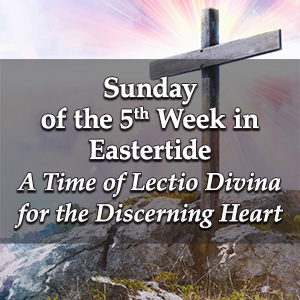 Sunday of the Fifth Week of Eastertide – A Time of Lectio Divina for the Discerning Heart Podcast
Sunday of the Fifth Week of Eastertide – A Time of Lectio Divina for the Discerning Heart Podcast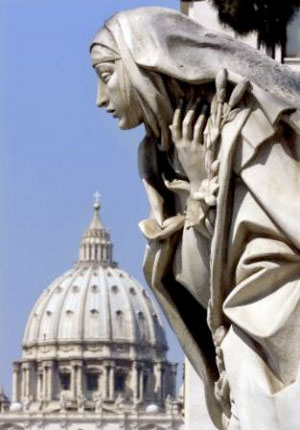
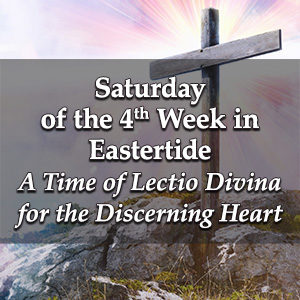 Saturday of the Fourth Week of Eastertide – A Time of Lectio Divina for the Discerning Heart Podcast
Saturday of the Fourth Week of Eastertide – A Time of Lectio Divina for the Discerning Heart Podcast